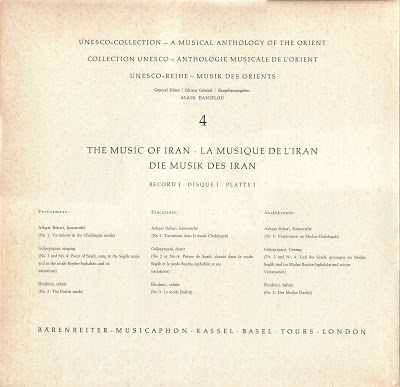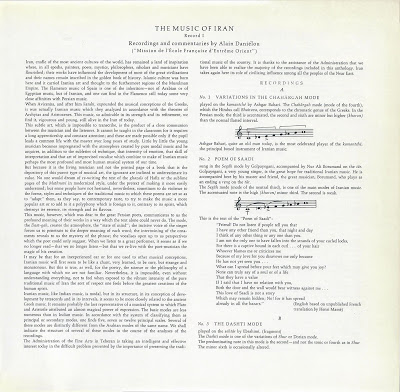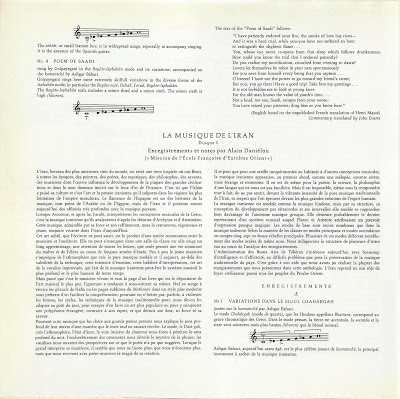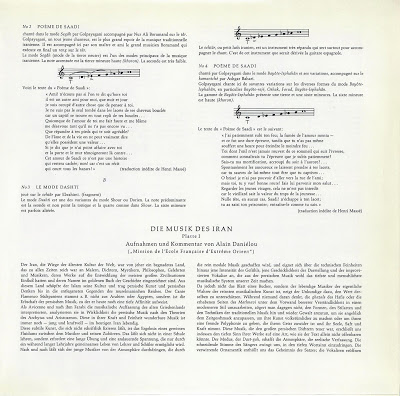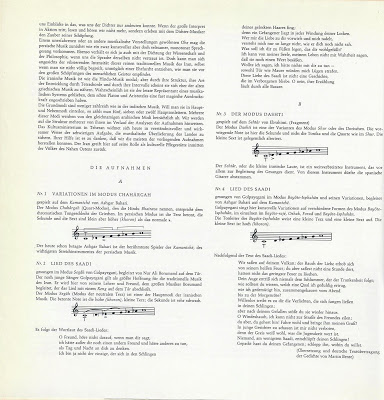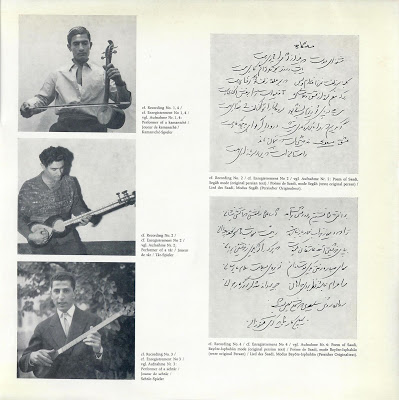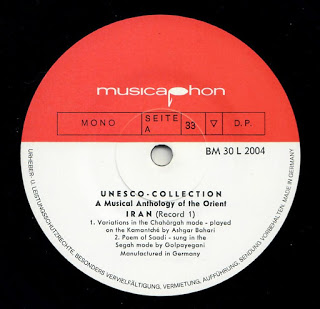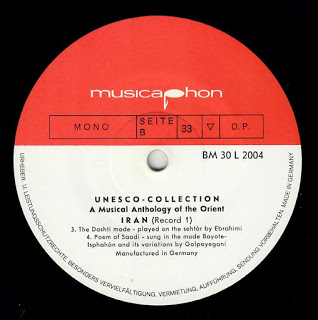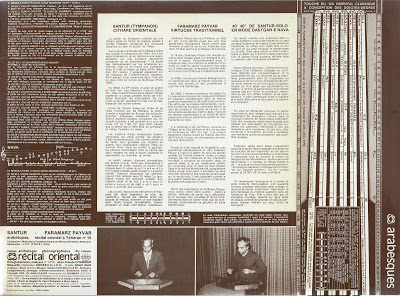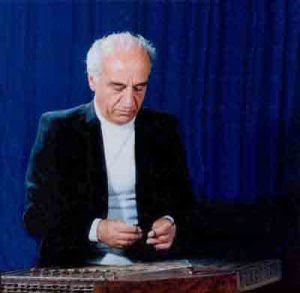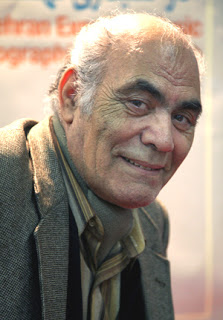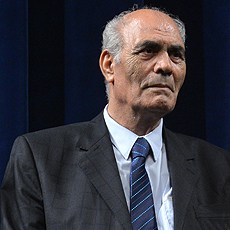We will post now the first two volumes of this excellent series. In 2016 we posted already volume 3 & 4 of this series. See
here:
When this LP came out in 1979 I bought it immediately. It was for me one of the biggest openings in the domain of tradtional Oriental music I ever had. Before there were already a number of LPs of classical Persian music on the market, but the musicians on these were all from the generation of the so-called Radio musicians. Their aim was to please and entertain a huge public and often was quite sentimental. Their version of the classical Dastgah music lacked most times the depth and the refinement and the amazing inner archtitecture of that music, next to classical North Indian music perhaps the most refined musical tradition of the Orient.
There was only one exception: on the LP
Iran I - A Musical Anthology of the Orient - 4 released by the German label Bärenreiter in the early 1960s there were two long pieces by an excellent singer, on one side accompanied by his master Nur Ali Borumand. I remember well how fascinated I was by this singer and especially the extremely fluid and dense Tar playing of Nur Ali Borumand which was so different from everything else I had heard. By the way, he was one of the teachers of the artist we have here. We hope to be able to post this LP soon.
With this Anthology all of a sudden one was introduced to a completely different calibre of musicians, all students of the last great Radif masters. These Radif masters were completely unknown by the big public and they hardly ever were recorded, except for educational reasons. Nothing was published on LP or otherwise. Only long after their passing away, starting in the 1980s and the 1990s, an Iranian label, Mahoor, published step by step first on cassette and then on CD many recordings by these masters, from private collections or those of institutions. These masters included Ali Akbar Shahnazi, Sa'id Hormozi, Yusef Forutan, Nur Ali Borumand, Musa Mar'ufi, Adib Khansari, Abdollah Davami and some others. Also to this generation belongs the outstanding Abolhasan Saba (1902-1957), who was well-known by the general public as a violin player. But no one except some close musician friends knew that he was also the greatest Setar player of his generation, which he never played in public. Only when in the 1990s some CDs of his Setar playing were published music lovers became aware of his genius.
The last great Radif masters were/are Dariush Safvat, an outstanding Setar and Santur player and a student of Saba, and Hatam Askari (Asgari) Farahani (born 1933), the master of an amazing vocal Radif. In 2011 we posted a set of four cassettes of a short version of his Radif, accompanied on Setar by Dariush Safvat. See
here.
So when this first LP and the following volumes were released one had for the first time (with the exception mentioned above) the chance to hear the real Dastgah music, in its depth and refinement worlds away from what one was able to listen to before. These LPs were for years amongst my most favourite LPs and I listened to them hundreds and hundreds of times. This music has a depth and inner architecture or inner logic one hardly ever is able to fully grasp. This makes this music forever satisfying because there is always still something which one has not yet reached and which draws one deeper into this music. Todays musicians, with 2 or 3 exceptions next to the two artists we post here, are not really aware of the great heritage they have and don't dive deep into this shoreless ocean to explore it and come up with some never before heard jewels from its depths. They rather opt to create some compositions or do some improviations which the big public likes. One of these 2 or 3 exceptions, a wonderful musician, told once my Iranian friend, that before he starts to play he imagines all his teachers sitting in a half circle in front of him and only when he feels their presence he starts to play. This way he approaches the music with the utmost respect and performs in the spirit of the great tradition he had received from his masters. One feels with all the other well-known musicians that they don't do that and the result is a lack of respect for the tradtion and this makes their music in one way or the other trivial, unfortunately. They always opt for the fast success and not for the hard, but extremely rewarding work. Part of these remarks are, by the way, also true for every great tradition of the Orient, especially Raga music.
The producer of these LPs was the legendary musicologist Jean During, who introduced the west to many great musical traditions of Iran, Azerbaidjan, Central Asia and Baluchistan, by producing LPs and CDs, writing books and bringing these musicians for concerts to Europe.
He wrote a couple of years ago a wonderful book, one of the most excellent books on music I ever read:
Musiques d'Iran - La tradition en question. In this book he shows in depth the different levels of Iranian Dastgah music and explains in a way never formulated before the nature of the Radif. This book was another big opening for me, as it formulated things I always felt more or less vaguely, but was unable to formulate..
The artists on these LPs continue the tradition of the great masters mentioned above. Dariush Tala'i became quite known through this LP and later his tours in Europe and other releases. I had the chance to see some of his concerts in Holland in the 1990s.

